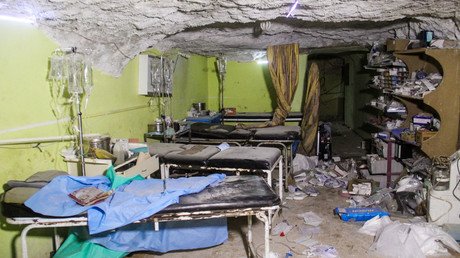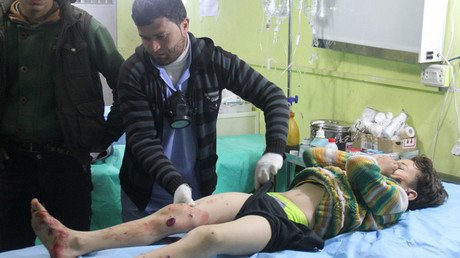OPCW-UN report on Syria chemical attack ‘flawed & logically inconsistent’ – Moscow
Russia has criticized the latest OPCW-UN report which blames Damascus for the chemical attack in Syria’s Idlib province in April, pointing out the many discrepancies, questionable witness accounts and unverified evidence which forms the basis of their assessment.
The Russian Foreign Ministry said it has already found serious flaws in the methodology of the recently released report of the OPCW-UN Joint Investigative Mechanism (JIM), Deputy Foreign Minister Sergey Ryabkov told RIA Friday.
The conclusions of the report circulated at the UN Security Council (UNSC) Thursday raise “great doubts,” Ryabkov said, noting that the findings are based on the same old evidence and testimonies derived from “biased sources.”
Moscow further challenges the conclusions because of the investigators’ “non-compliance with the requirements of the Convention on the Prohibition of Chemical Weapons, according to the sequence of collection and storage of material evidence.”
“All these logical inconsistencies, internal contradictions are visible even after the first cursory reading,” the diplomat added.
The Khan Shaykhun chemical attack happened on April 4, 2017, an area of the Idlib Governorate that was under the control of Tahrir al-Sham, better known as the Al-Nusra Front terrorist group. The sarin gas release, which reportedly claimed the lives of between 74-100 civilians, happened after a Syrian Air Force anti-terrorist operation in the town. Damascus said it targeted the terrorists using only conventional weapons.
The investigators never visited the site of the incident, citing security concerns. And because the “integrity of the scene was devalued” after the “crater from which the sarin emanated was disturbed after the incident and subsequently filled with concrete” by the militants controlling the area.
Nevertheless, in its report, JIM said “the Leadership Panel is confident that the Syrian Arab Republic is responsible for the release of sarin at Khan Shaykhun on 4 April, 2017.”
Reviewing the contents of the report, the Russian Foreign Ministry on Friday said that JIM’s findings ignored conclusions drawn by Russian specialists.
“It is evident after looking through the report, that the conclusions and opinions of Russian specialists that were referred to JIM at its own request have been totally ignored. Moreover, it gives no answers to our questions either,” the ministry said.
Real investigation needed: Chemical incident in #Syria's #Idlib is 'likely staged' - Moscow https://t.co/r0afzgUEbg
— RT (@RT_com) October 14, 2017
Instead, the ministry said, the report produced “diametrically opposite conclusions” that are based on anonymous research centers, open-source information and so-called ‘independent experts,’ which lack any convincing proof to support their findings.
‘Many gaps & omissions’ plague chemical watchdog’s Idlib incident report – Russian OPCW rep to RT
In separate commentary, the ministry questioned why repeated requests by the Syrian government for the UN team to share not only the lab results, but also the actual samples stored in the Organisation for the Prohibition of Chemical Weapons (OPCW) laboratory, were only partially fulfilled following months of negotiations.
While it was provided with lab results, the biochemical samples which had allegedly been collected at the site were never sent to Damascus.
“Apart from that, the OPCW Technical Secretariat constantly dodges answering the question, whether it received the samples allegedly taken at the scene of the Khan Shaykhun incident by the British and French. According to Convention [on the Prohibition of Chemical Weapons], these samples should be presented to the country, where they were collected,” the statement reads further.
Such discrepancies in the process not only violates Syria’s rights as a member of OPCW, but raise serious questions about the impartiality of the UN and the OPCW investigation team, Russia’s Foreign Ministry said.
“There’s only one conclusion – as the US and their ‘like-minders’ continue to escalate the situation with the Syrian ‘chemical dossier,’ more and more glaring examples of the ‘double standards’ in their approach towards Syria at the UNSC and OPCW platforms,” the statement adds.
Damascus has also rejected the report’s findings, charging that it apparently “came in implementation of the instructions of the US administration and Western countries to exert more political pressures and threats to Syria’s sovereignty,” Sana reported citing a source at Foreign and Expatriates Ministry.
“Syria strongly condemns the direct and indirect accusations against it which were included in this report and the previous one since they represent a falsification of the truth and distortion of all accurate information about what happened in Khan Shaykhun.”
Moscow said it would provide a “more detailed analysis” next week, after carefully studying the report. The ministry promised to issue a response on the possible extension of JIM’s current mandate which is due to expire on November 16.
READ MORE: Russia vetoes UNSC resolution on renewing Syria chemical weapons probe
Russia, on Wednesday, blocked a UNSC draft resolution on the extension of the OPCW-UN mission’s mandate, emphasizing that a continuation of the decree should be decided only after assessing JIM’s report, and the investigative team’s performance, independence, and objectivity.
Western nations have meanwhile welcomed the conclusions of the report. The findings were promptly praised by US officials as adamant and “impartial” proof of the alleged crimes attributed to Syria’s President Bashar Assad.
“Time and again, we see independent confirmation of chemical weapons use by the Assad regime,” Nikki Haley, the US envoy to the UN said in a statement.
Britain, on Friday, urged the UNSC to impose sanctions on Syria: “A robust international response is now essential to hold those responsible for the Khan Shaykhun attack to account... It now falls on the Security Council to act on these findings and to deliver justice,” British Ambassador Matthew Rycroft told reporters.
China’s reaction, however, appeared to be more guarded: “We hope the conclusion of any investigation should be grounded on solid and reliable evidence, conforms to the principle of professionalism, objectiveness, and justice and will stand the test of history,” Foreign Ministry Spokesperson Geng Shuang’s told reporters Friday.














